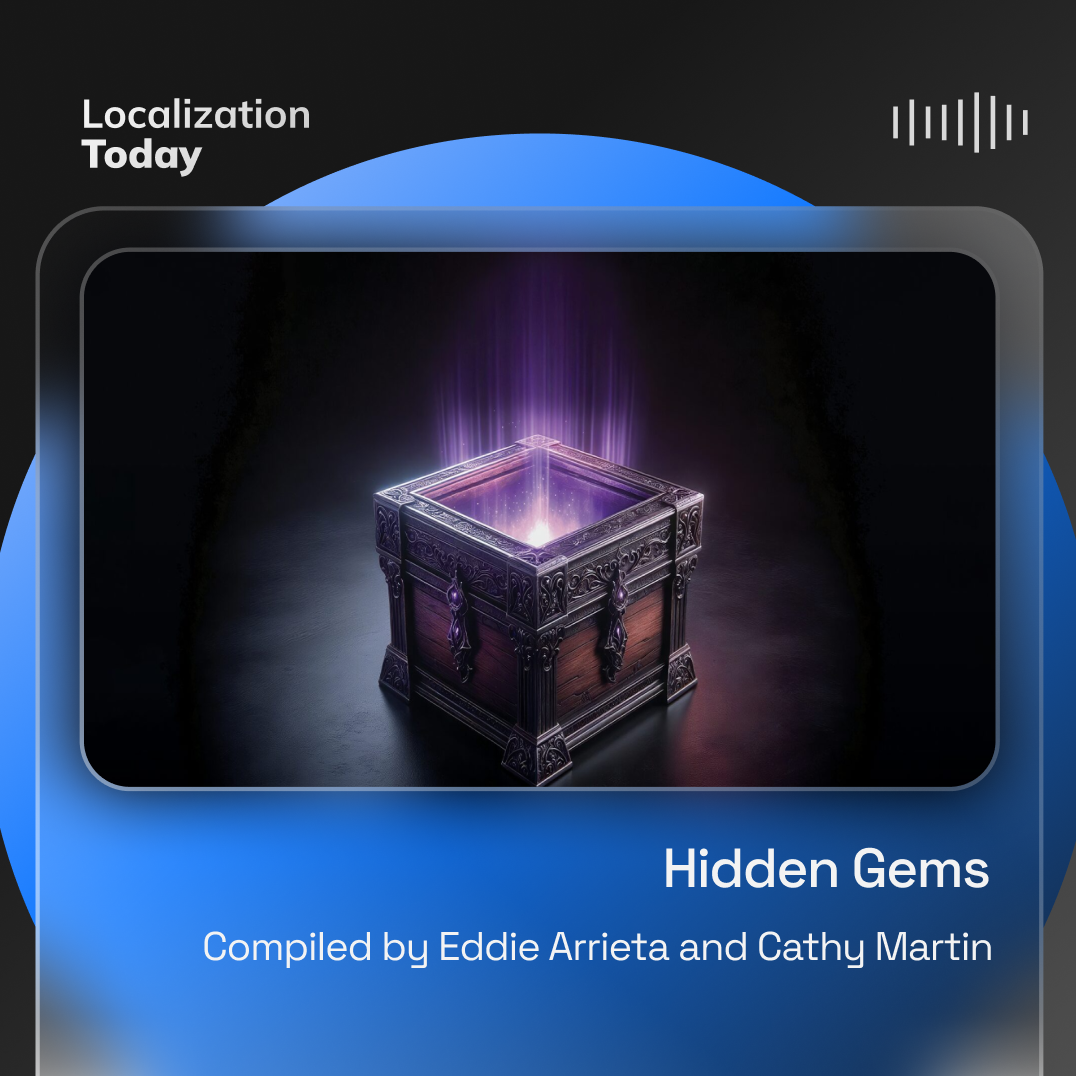Episode Transcript
[00:00:00] Magic Mayhem and mergers the wild world of nineties japanese rpg localization by Cameron Resmason this guy are sick. Those four simple words probably sound like an elementary grammatical error to most people, but say them to the right person, likely an individual between 30 to 45 years old, and watch their eyes light up. Because this guy are sick doesn't just demonstrate a shaky grasp of english number agreement. Its also a beloved mistranslation from the classic video game Final Fantasy VII, released in January 1997 in Japan and September of the same year in America today, a similar translation error in a AAA title would be an embarrassment. Times have changed, and video games are now big business, with ballooning budgets and ever growing profits now standard for the industry, translation and localization efforts have similarly expanded in scope and production value. It's not just a matter of translating the japanese text on a spreadsheet anymore. Localizing a video game from a major studio means translating a script, redoubting the voice, acting, revising character, lip movements and animations accordingly, and so much more. But three decades ago, it was a much different story, a sort of wild west for the burgeoning video game translation field, where the work of making a multi million dollar production comprehensible for millions of new players often fell to just a few people in the span of just a few years, western localizers, using laughably rudimentary technology and techniques compared to the tools of today, redefined what it meant to translate and localize video games for western audiences. Aiden Maher, author of fight Magic items, the history of Final Fantasy, Dragon Quest, and the rise of japanese rpg's in the west, wrote for the Washington Post. For video game creators, it was a scrappier time, to be sure, a time when experimentation and inspirations ranging from Kentaro Miura's manga berserk to the works of psychologist Carl Jung, yielded wild bursts of creativity, and yes, that brought with it its share of rough edges. But it was also an era when a relative lack of corporate oversight gave game creators license to loose their wildest dreams upon the world, and it fell to those unsung heroes, the underpaid and overworked translators, to make those dreams understandable.
[00:02:28] The third and fourth generations as the 1990s dawned, the sun set on the third generation of video game history, which arguably saved, or at least reordered, the business. The third generation commenced with the video game market crash of 1983, saw the release of Nintendo's Famicom, later rebranded as the Nintendo Entertainment System for its north american launch and Sega's Master system, and set new conventions for game releases to come. Perhaps the most dramatic shift was in the console market previously dominated by american companies like Atari. The 1983 video game Crash shifted the focus toward japanese companies like Nintendo, Sega, and later Sony, and solidified the need for robust software localization efforts. Moving forward, while american developers broke new ground on PC and Macintosh computers with more complex titles like Ultima and Wizard Surgery, Nintendo and Sega set themselves apart with a focus on faster paced, action oriented games that were easier to pick up and play. But just because Super Mario Bros. Was the headline title for the mighty Grey Nintendo Entertainment system doesnt mean experimentation wasnt already occurring. Inspired by the relatively dense PC titles like Wizardry, which wore its ben and paper dungeons and Dragons inspirations on its sleeve, japanese developers at Enix and Squaresoft sought to adapt those ideas in a more approachable, console friendly format, the result of their efforts the still popular Dragon Quest and Final Fantasy franchises. Due to the eras hardware limitations, there was a ceiling to the narrative complexity these early Nintendo role playing games could manage. All that was about to change, though, as Nintendo had big plans to launch new hardware for a new decade. The fourth generation was imminent and the major leap in computational power accompanied similarly transformative changes to video games artistic potential. While all video games depended upon localization for international success, one genre stood out in its dependence on the written word and narrative ambitions, the rpg. A few titles, particularly those of the fifth generation, promised to test small localization teams with the increased power and storage applied by Sonys cd based PlayStation 32 bits New Horizons even today, Final Fantasy VII is an inescapable pop culture presence. It almost single handedly introduced japanese rpg's to millions of english speakers worldwide and is considered one of the greatest and most influential games of all time, a work of cutting edge production value compared to its predecessors, Final Fantasy VII utilized the 32 bit PlayStation's polygon pushing processor and copious cd based storage to transition its graphics from 2d pixel sprites and backgrounds to 3d characters exploring hyper detailed, pre rendered 3d backgrounds. And most impressively for the time, cd storage allowed for beautiful 3d animated cutscenes that became the centerpiece of the games marketing campaign. While Squaresoft sunk a fortune into marketing Final Fantasy Seven in America, the company pinched its bennies in localizing the game. According to game writer Wesley Fenwin, the task fell to Michael Baskett at Squaresoft's north american headquarters. A persistent urban myth suggests that basket translated the entirety of Final Fantasy Seven's script, but according to Richard Honeywood, you kick started his career localizing classic PlayStation era Squaresoft games he had support from a team of freelancers. The translation was rough, full of grammatical errors and weird turns of phrase that have become an integral part of the game's legacy, Fenlan wrote. But considering how the game was localized, its surprising there werent more errors. Writer, japanese english translator and game developer Tim Rogers explains in his video series lets Mosey a slow translation of Final Fantasy seven for game website Kotaku that the text in the games mammoth script is crammed into small on screen boxes and it needed to fit regardless of word size disparities between the two languages. For instance, washing machine requires 15 english characters versus only three japanese characters. Of course, Rogers delves into his theory behind the fan favorite typo. This guy are sick. He believes the error resulted from the confusing nature of some japanese plural words and the arrangement of text blocks in the spreadsheet. According to Rogers, the translator likely believed the line referred to an entire town rather than an individual. Changed these people to this guy upon realizing the error and forgot to change r to his learning its lessons from the Final Fantasy seven localization process, Squaresoft said about bolstering its capabilities. We built it up to a team of over 50 people by the time I left ten years later, all internal plus we had the us office as well, Honeywood told multilingual. In 2022. I learned all the best practices, like planning a proper schedule and working out the speed of each translator. He you figure out what type of text each person excels at. Some could be good at Sci-Fi and some could be good at classical text, whereas some just aren't good at system text. Honeywood would need all the experience he could garner as future square soft rpg's and business decisions would test his capabilities.
[00:08:05] Burning ambitions according to Maher in his Washington Post article how the greatest japanese rpg's of the nineties came to the west, Honeywood took over the localization of Squaresoft's next major rpg, xenagears. Even with the benefit of modern translation tools, Xanagiers would present a decision making challenge. A wildly ambitious scife saga encompassing thousands of years of history, Xanagiers draws influence from sources as varied as freudian psychology, nietzschean philosophy, jewish and christian mysticism, japanese mechi anime, and classic Sci-Fi literature, and movies like Soylent Green. If its density wasnt challenging enough, the game explores sensitive religious themes that Henny woods localization team worried would draw controversy from the wests majority christian populations. Xenogears presented a hell of an uphill battle for Honeywood and his colleagues Nabi and Bella. So much so that Nabi left the project, fearing the response from religious groups in the west to the games scrutiny of religion, Maher wrote for the Washington Post. Xanagirs anime cutscenes were another obstacle. One of Squaresofts first explorations into voice acting later expanded in games like PlayStation action rpg Brave fencer Musashi and the PlayStation two s groundbreaking Final Fantasy. Xenagears cutscenes presented the puzzle of matching english voice acting with the animation's lip movements, but it was invaluable experience that codified the next phase of Squaresoft localization, including the implementation of a familiarization and glossary creation period and direct translation from japanese to French, Italian, German, and Spanish. As luck would or would not have it, xenogears flew too far under the radar to generate much religious controversy. Although it enjoys a cult classic following and several spiritual successors to date, its ambitious narrative was far from an existential crisis that would come toward the end of Honey Woods Square soft tenure courtesy of Final Fantasy creator Hironobu Sakaguchi remember those beautiful 3d cut scenes that made Final Fantasy seven an international mega hit? Well, Squaresoft only improved its artistry through its work on myriad titles including Final Fantasies 810, Parasite Eve, and Chrono Crosse. Recognized as a global leader in 3d animation by the dawn of the 21st century, Squaresoft, helmed at that time by Sakaguchi, turned its ambitions beyond video games to the film industry. With the creation of Square Pictures, the team began work on its first and only feature film, Final Fantasy, the spirits within. While as visually beautiful and polished as one would expect from Squares 3d animation team, Final Fantasy, the spirits within failed to find an audience bombing at the box office and dealing a grievous financial blow to Squaresoft. The subsequent turmoil Sar Sakaguchi's resignation, and labored course correction. Once the company recovered, early discussions began regarding a merger with japanese rpg rival Enix of Dragon Quest fame. The deal was finalized in 2003, with the two companies reborn as Square Enix. But it wasnt all sunshine, at least not for Honeywood. The merger unleashed chaos upon his team as they scrambled to recover as much of their work as possible, even finding game source code for Final Fantasy I two and three stored on molding lp sized floppy disks. A major job was salvaging source code that was being lost before our very eyes. We actually did lose the entire source code of Final Fantasy three, Honeywood told multilingual. It was too moldy to save, and that's why Ray releases were all emulation. They couldn't reprogram it because they lost the source code. Honeywood eventually moved on to the next stage of his career at Blizzard Entertainment, now Activision Blizzard, following yet another highly publicized merger in 2007. But he values the experience he acquired at Square Enix and still sees the fruits of his work and titles today. For instance, he can see the direct links between his work on Squaresoft's first massively multiplayer online rpg, Final Fantasy eleven, and its highly acclaimed successor, Final Fantasy 14. I actually trained up the guys that took over not just Final Fantasy eleven, but moved on to Final Fantasy XIV, he told multilingual. So all the know how from eleven is there, and they are using a lot of the linguistic background systems and the other technology that I implemented on that game the end is the beginning 20 years removed from the days of classic Squaresoft, the world of video game localization is dramatically different. Some practices and procedures established in those nascent years are the foundation of game localization today, while others have been replaced by improved technology. For all the changes, however, the role of the game localization linguist remains the same. Its still a role as creative as it is technical, one driven by a love for communicating exciting and often profoundly moving experiences across borders. Thanks to the many unsung heroes of those nascent localization teams, destinies were altered, careers were inspired, and international cultures were irrevocably reshaped. That impact persists today. Final Fantasy might have outgrown moments like this guy are sick, but the work its linguists do today is just as impactful and just as potentially life changing. Anything goes is not war. Translation is veteran translator Alexandro Smith told Maher for his book Fight Magic items. Localization is the practice of finding the best version of the original work in a new language. Its about being inspired by the original to create something that hopefully works the same way that the original work, but for a new audience.
[00:14:10] This article was written by Cameron Rasmussen, a senior writer and editor for multilingual media.
[00:14:17] Originally published in multilingual magazine, issue 229, June 2024.


